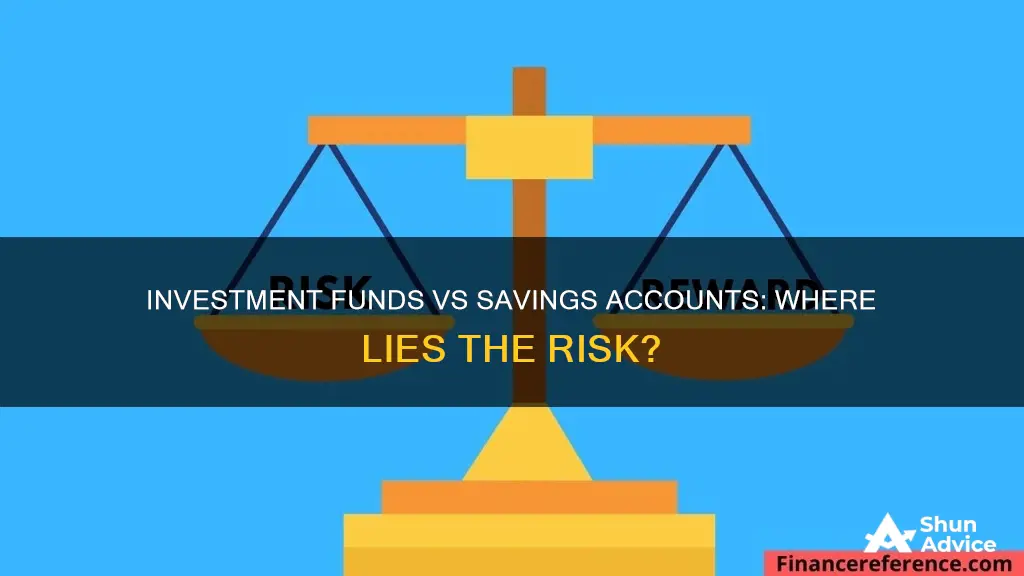
Saving and investing are both important for building a sound financial future, but they are not the same thing. While both can help you achieve your financial goals, it's crucial to understand the differences between the two and when it's best to save or invest. The main difference lies in the level of risk involved. Saving typically offers lower returns but carries minimal risk, while investing allows for higher returns but comes with the possibility of losing money. This paragraph aims to introduce the topic of risk comparison between investment funds and savings accounts, a complex subject that warrants further exploration to make informed financial decisions.
| Characteristics | Values |
|---|---|
| Risk | Investment funds carry a higher risk of losing money. Savings accounts are a safer option, with a very low risk of losing money. |
| Returns | Investment funds have the potential for higher returns. Savings accounts have lower returns. |
| Time horizon | Investment funds are suitable for long-term goals (e.g. retirement). Savings accounts are better for short-term goals and emergency funds. |
| Liquidity | Investment funds may have barriers to access, such as penalties or taxes for early withdrawal. Savings accounts offer immediate access to funds. |
| Inflation protection | Investment funds can help protect against inflation over the long term. Savings accounts may lose purchasing power due to inflation. |
| Taxes | Investment funds offer tax advantages for long-term gains. Savings accounts are taxed at ordinary income rates. |
What You'll Learn

Savings accounts are low-risk, but also have low returns
Savings accounts are generally considered a low-risk option for storing your money. This is because they are often insured, so your money is protected even if the bank fails. Savings accounts also offer immediate access to your money, which can be easily transferred in and out of the account.
However, the low-risk nature of savings accounts means that the returns are also low. The interest rates on savings accounts tend to be quite low, and the returns may not even keep up with inflation, causing you to lose purchasing power over time. This is because banks and credit unions are not highly motivated to increase interest rates, as customers rarely switch accounts. Additionally, banks profit when the rate they charge on loans is higher than the rate they pay to those with savings accounts. Therefore, they keep savings account interest rates low to maximise their profits.
While savings accounts offer a safe place to store your money, the low returns mean that your money may not grow significantly over time. Thus, it is important to consider your financial goals and risk tolerance when deciding whether to save or invest your money.
Fidelity Investments: Mutual Fund Performance Review
You may want to see also

Investment funds carry a higher risk, but also offer higher returns
While saving is a crucial part of any financial plan, it is essential to combine it with other forms of investing to achieve a balanced approach to financial planning. Investment funds carry a higher risk than savings accounts, but they also offer higher returns.
Higher Risk
Investment comes with risk, but also the potential for higher returns. When investing, you could lose money, break even, or earn a return—there are no guarantees. The stock market can fluctuate daily and, historically, it fluctuates by about 15% throughout the year. It is impossible to predict how long these fluctuations will last, as so many factors influence them. If you need to withdraw money when the market is down, you'll have to sell at a loss.
Higher Returns
Over time, the Standard & Poor's 500 stock index (S&P 500) has returned about 10% annually, though returns can fluctuate greatly from year to year. The longer you can invest, the more risk you can take on, because you have more time to ride out the ups and downs of the stock market.
Long-term Goals
Investing is a way to reach long-term financial goals, such as saving for college, a down payment on a house, or retirement. It is crucial to achieving long-term goals like retirement.
Risk and Time Horizon
The younger you are, the more risk you can afford to take. The longer you leave your money invested, the more time it has to grow, typically with a higher return than what a savings account will offer, and the more time your investment has to recover from any downturns.
Diversification
You can reduce this risk by diversifying your investment portfolio so you don't lose all your money if one investment fails. Investors diversify by owning multiple stocks or by purchasing mutual funds and exchange-traded funds (ETFs).
When to Save and When to Invest
Saving is generally a good idea if you have short-term goals, such as saving for a new phone, laptop, or vacation. Saving is also important for building an emergency fund.
Compound Interest
By investing consistently over time, you can benefit from compounding returns and potentially grow your retirement savings significantly.
Smart Ways to Invest Your Rainy Day Fund
You may want to see also

Savings accounts are good for short-term goals
Savings accounts are a great option for short-term goals. They are a safe and low-risk way to store money, and they offer easy access to your funds. Here are some reasons why savings accounts are good for short-term goals:
- Safety and Low Risk: Savings accounts are insured by the Federal Deposit Insurance Corporation (FDIC) in banks and the National Credit Union Administration (NCUA) in credit unions. This means that your savings are protected up to certain limits, making savings accounts a safe and secure option.
- Liquidity and Easy Access: Savings accounts offer liquidity, allowing you to withdraw funds whenever needed during business hours. Online banking also provides the convenience of making withdrawals on evenings or weekends, which will be processed on the next business day.
- Interest Earnings: Savings accounts enable you to earn interest on your balance, helping your money grow over time. While the interest rates may be lower compared to other investment options, it is still a way to earn passive income on your savings.
- Goal-Setting: Savings accounts are ideal for allocating funds towards short-term financial goals. Whether it's an emergency fund, vacation fund, or saving for a large purchase, savings accounts provide a dedicated place to set aside money for specific purposes.
- No Complexities: Savings accounts are straightforward and easy to use. You can open an account online or at a bank or credit union, and there are usually no complex procedures or requirements involved.
While savings accounts are excellent for short-term goals, it's important to note that they may not provide the highest returns compared to riskier investments. Additionally, there may be limitations on the number of withdrawals or transactions allowed per month, and minimum balance requirements may apply to avoid fees. Nevertheless, for short-term financial goals, savings accounts offer a secure and accessible way to manage your money.
Smart Mutual Fund Investments: 5K and Beyond
You may want to see also

Investment funds are better for long-term goals
While both saving and investing are key components of personal finance, investment funds are better for long-term goals.
Saving is an excellent way to meet short-term financial goals and prepare for unexpected situations. It is a crucial part of any financial plan and provides a safety net for emergencies. Savings are generally low-risk, meaning your money is safe, but the interest rates received are also low.
On the other hand, investing is a way to grow your money over time and achieve long-term financial goals. It typically comes with a longer-term horizon, such as children's college funds or retirement. While investing involves taking on some risk, it also offers the potential for higher returns.
Potential for Higher Returns
Investing offers the potential for higher returns compared to savings accounts. By taking on some risk, you increase the opportunity for greater gains. This is especially beneficial for long-term goals, as it allows your money to grow over an extended period.
Beating Inflation
With savings accounts, there is a risk of losing purchasing power due to rising inflation. In contrast, investing in the right vehicles can help you beat inflation and preserve the value of your wealth. This is crucial for long-term goals, as you want your money to retain its buying power over time.
Compounding Returns
Compounding returns are a significant advantage of investing, especially for long-term goals. By reinvesting your returns, you can accelerate your wealth accumulation. The longer you invest, the more your returns can compound and grow, making it ideal for long-term goals.
Tax Benefits
Certain investment options, such as retirement accounts, offer tax advantages. For example, contributions to a 401(k) plan are often tax-deductible, and the investments grow tax-deferred. This means you can maximize your returns and achieve your long-term goals faster.
Diversification
Investing allows you to diversify your portfolio and reduce risk. By investing in various assets, sectors, and geographic regions, you can lower the impact of market volatility on your long-term goals.
In conclusion, while saving is essential for short-term needs and emergencies, investment funds are better suited for long-term goals. They offer the potential for higher returns, help beat inflation, provide compounding returns, offer tax benefits, and allow for diversification. By investing for the long term, you can increase your chances of achieving your financial objectives.
Mutual Fund Investment: Timing and Location Strategies
You may want to see also

Savings accounts are good for emergency funds
Savings accounts are a great option for emergency funds. They are a safe place to store your money, with easy access when you need it. Here are some reasons why savings accounts are good for emergency funds:
- Safety: Savings accounts are insured by the Federal Deposit Insurance Corporation (FDIC) for up to $250,000 per depositor, making them a low-risk option. Credit unions offer similar protection through the National Credit Union Administration (NCUA).
- Liquidity: Savings accounts offer easy access to your funds. You can withdraw money during business hours, and online banking allows you to request withdrawals outside of these hours for the next business day.
- Interest earnings: Savings accounts allow you to earn interest on your money. While the interest rates may be lower than other investment options, your money can still grow over time.
- Goal-setting: Savings accounts are perfect for allocating funds for financial goals, such as an emergency fund.
- No investment risk: Unlike investments, savings accounts offer a consistent and safe rate of return without the risk of losing money.
- Accessibility: You can open a savings account with a relatively low minimum deposit, and there are options available at both online and traditional banks, as well as credit unions.
Best Vanguard Funds to Maximize Your 401(k) Returns
You may want to see also
Frequently asked questions
A savings account is a low-risk option for storing money, whereas an investment fund is a higher-risk option for growing money.
Savings accounts are a safe and easily accessible way to store money. They are also very liquid, meaning you can get your money quickly when you need it.
The returns on savings accounts are low, and there is a chance you will lose purchasing power over time due to inflation.
Investment funds offer the potential for higher returns than savings accounts. They are also a good way to achieve long-term financial goals, such as saving for retirement or buying a house.
There is a risk of losing money with investment funds, and returns are not guaranteed.







